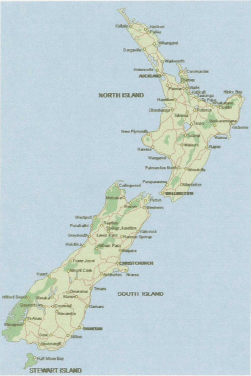 Population: 4.2 Million
Population: 4.2 Million
 Language: New Zealand has two official languages – English and Maori.
Language: New Zealand has two official languages – English and Maori.
Peoples: The Maori people are recognized as the native people of NZ, but only make up 14.6% of the population. The other major people groups include:
67.6% – Pakeha (those of white European decent)
9.2% – Asian
6.9% – Pacific Islanders
Government: Parliamentary Democracy
Capital: New Zealand’s capital is Wellington, located at the southern end of the North Island. It has a population of 370,000.
BRIEF HISTORY/BACKGROUND
History – New Zealand was first discovered by Dutch explorer, Abel Tasman, in 1642-43. He named it New Zealand after “Zeeland” in The Netherlands. Captain James Cook claimed New Zealand for England on his 1769-78 voyage and New Zealand became a British colony. New Zealand was valuable as a whaling port in the South Seas. It also provided vast quantities of timber and fertile farm land. New Zealanders are proud of the fact that they were the first in the world to give women the right to vote in 1893. They are also proud of the fact that it was a New Zealander, Sir Edmund Hillary, who first climbed Mt. Everest. New Zealand was given its independence from Great Britain in 1947, and is still part of the British Commonwealth.
Economy – New Zealand’s economy relies heavily on export and has an agricultural base. Its top three exports are dairy products, meat and timber. Its largest manufacturing industry is food processing.
Religion – Less than 5% of the people of New Zealand attend any kind of religious services on a regular basis. However, 17% claim to be Anglican, 14% Roman Catholic and 11% Presbyterian. 40% of New Zealanders claim no religious affiliation at all.
GFF’S MINISTRY IN NEW ZEALAND
GFF has targeted the northwestern part of the Auckland region to begin a church planting ministry.
Two main factors make this a key-growth area:
The connection of the western motorway with the northern motorway.
The conversion of the Hobsonville Air Force base to civilian use.
The Auckland Regional Council has estimated that 120,000 people will be moving into this area in the next 10 years. G.F.F. recognizes this as a prime opportunity to get in on the “ground floor” to establish sound, Bible-believing churches in a new community.
GFF’s STRATEGY IN NEW ZEALAND
GFF church planters will move into the target area, to become part of the community, to establish relationships and begin evangelism. As people are led to Christ and discipled they will be incorporated into local Bible studies. As these studies grow and national leadership develops, these Bible studies will be merged to form a local church. There is a great possibility of developing more than one local church at a time in different locations.
CURRENT NEEDS
1. More church planting families to form a team with our current GFF
church planters in NZ.
2. Short-term workers (1-2 years) who are teachable and willing to assist the career church planters in general ways.
3. Short-termers with special abilities and talents that can be used for outreach (e.g. music, computer skills, ESL, finances, graphic art, biblical family counseling, art, etc.)
GFF is looking for men and women who are called of God to serve on the field in different parts of the world. GFF has competent, experienced leadership and is willing to assist workers to become successful for the glory of God.